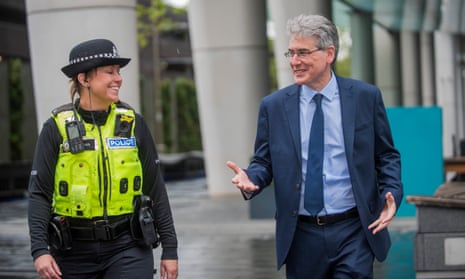Thousands of young people in the UK are being exploited by criminals and used as “money mules” to move cash between accounts, undetected by police.
The West Midlands police and crime commissioner, Simon Foster, this week launched a campaign on TikTok and Instagram warning teenagers against the dangers of being offered cash to use their bank account to transfer funds to another account. Offenders recruit a third party to help move money in a way that avoids detection by police.
Birmingham has recorded the highest number of money mule cases of any council area in the country, with statistics from the Cifas fraud prevention service showing West Midlands police identified nearly 3,000 likely cases between January and September last year.
Foster, who is launching the campaign in conjunction with the bank HSBC, said: “It is disgraceful and shameful that criminals are taking advantage of young people, just so they can try and evade the law. The offenders know that if they move their own stolen cash around then sooner or later they will be caught. That’s why they often criminally exploit young people and rope them in to doing their criminal work for them.”
Knowingly transferring money on behalf of criminals is money laundering and can be punished with up to 14 years in prison, but money mule victims can also suffer from a poor credit rating and struggle to get a bank account. “We need young people and parents to be aware and report any suspicious activity to the police immediately,” said Foster.
Mark* was 16 years old when he had £4,000 laundered through his account after being exploited by criminals, just two weeks after he got his first bank account. He said a fellow pupil at college pressured him to hand over his bank card with the promise of helping him make £4,000 profit.
Mark, now 17, said: “I was suspicious and made up an excuse and didn’t give it to him. But he was very angry, saying that I had missed a huge opportunity, and make sure I didn’t do it again. So he peer pressured me into giving it to him next time. Then this guy who I didn’t know called me up and made me do authorised transactions using money that had been put in my account. First £1,000, then some more.”
Mark said he had no idea what he had got involved in, although he never made any money, and he instead lost £50 from his account.
He said he then got a letter from his bank saying there had been “some dodgy transactions” from his account. “So I told my parents, who made me report it to the police. They told me it was criminal activity, money laundering,” he said. “It was all a bit of a shock. But it had been going on for so long and it was stressful dealing with it alone, so I was just relieved to finally tell someone.”
He said as a result of the incident he had been banned from opening another account with his bank.
after newsletter promotion
Natasha Moore, the local director for HSBC UK, said: “It might seem like a harmless way to increase your income, or even win favour with a new friend, but the money being transferred could well be stolen and ultimately used to fund organised crime, including terrorism.”
* Name has been changed.
